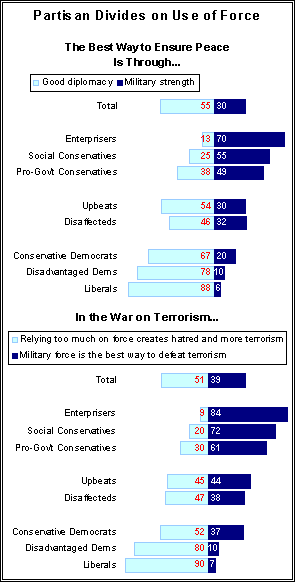 In an era when virtually all political issues are seen through partisan lenses, the political typology still finds numerous value cleavages in American society, many of which cut across party lines. In fact, public values about security and the use of military force are among the only value dimensions in which Republican and Democratic groups clearly align on opposite sides, and, even here, the intensity of opinion differs significantly within each coalition. Overall, the analysis finds that the intense partisan divide over security and military assertiveness is the exception, and not the rule. In most cases, there are fissures within the party coalitions that are at least as important as the divide between the parties overall.
In an era when virtually all political issues are seen through partisan lenses, the political typology still finds numerous value cleavages in American society, many of which cut across party lines. In fact, public values about security and the use of military force are among the only value dimensions in which Republican and Democratic groups clearly align on opposite sides, and, even here, the intensity of opinion differs significantly within each coalition. Overall, the analysis finds that the intense partisan divide over security and military assertiveness is the exception, and not the rule. In most cases, there are fissures within the party coalitions that are at least as important as the divide between the parties overall.
Foreign Policy Values
The extreme partisan polarization over the war in Iraq in recent years is interwoven with sharply divided judgments about national security and foreign assertiveness. Asked whether the best way to ensure peace is through military strength or through good diplomacy, the vast majority in all three Democratic-leaning groups choose diplomacy, while those in Republican-leaning groups express more confidence in military strength. While the degree of intensity within partisan groups may differ, there is a significantly greater difference of opinion between parties than there is within either party coalition.
This partisan divide is even broader when it comes to peoples’ views on the war on terrorism. Across all Republican groups most believe that using overwhelming military force is the best way to defeat terrorism around the world, while a clear majority in all Democratic groups believe relying too much on military force to defeat terrorism creates hatred that leads to more terrorism. These partisan cleavages underlie the fundamental divide over the war in Iraq and George W. Bush’s emphasis on the preemptive use of force, key aspects of American politics in recent years.
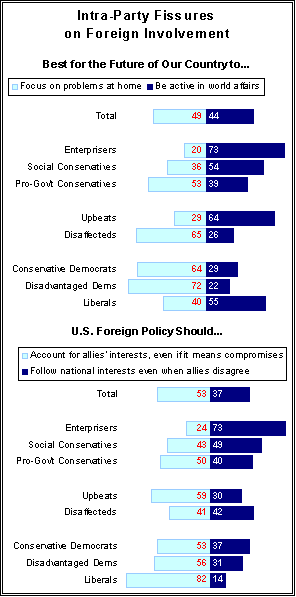 However, most issues, even within the realm of foreign policy more generally, do not display such a clear partisan pattern. In fact, in many cases the differences of opinion within the partisan coalitions are far greater than any partisan gap overall. Public opinions with respect to how active a role America should play in world affairs highlight this distinction. Each party coalition includes typology groups that express activist or isolationist sentiments. By a margin of 73% to 20%, Enterprisers believe it is best for the future of the country to be active in world affairs. By contrast, Pro-Government Conservatives, by a 53% to 39% margin, think we should pay less attention to problems overseas and concentrate instead on problems here at home. Similarly among the predominantly Democratic groups, the majority of Liberals favor an active role in world affairs, while most Conservative and Disadvantaged Democrats believe in focusing on problems here at home.
However, most issues, even within the realm of foreign policy more generally, do not display such a clear partisan pattern. In fact, in many cases the differences of opinion within the partisan coalitions are far greater than any partisan gap overall. Public opinions with respect to how active a role America should play in world affairs highlight this distinction. Each party coalition includes typology groups that express activist or isolationist sentiments. By a margin of 73% to 20%, Enterprisers believe it is best for the future of the country to be active in world affairs. By contrast, Pro-Government Conservatives, by a 53% to 39% margin, think we should pay less attention to problems overseas and concentrate instead on problems here at home. Similarly among the predominantly Democratic groups, the majority of Liberals favor an active role in world affairs, while most Conservative and Disadvantaged Democrats believe in focusing on problems here at home.
In other areas, only the most ideologically driven groups express views that are significantly different from the national average. In making foreign policy decisions, the Enterprisers overwhelmingly say America should follow its own national interests even when the allies strongly disagree, while the consensus among Liberals is that U.S. foreign policy should take into account the interests and views of allies, even if it means making compromises with them. Most other typology groups, whether on the right or the left, are internally divided on this question, and have more in common with each other than they do with either of the extremes.
Cultural Issues Divide Democrats
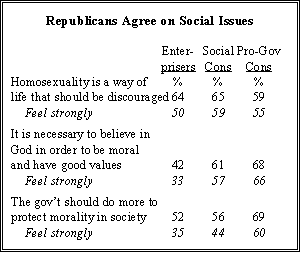 Despite differing degrees of religious intensity among core Republican groups, there is little evidence that the current slate of moral and values-oriented issues threatens to divide the Republican electoral base in any significant way. While Enterprisers are defined mostly by their pro-business, anti-government and anti-regulatory beliefs rather than their religious or moral conservatism, they nevertheless agree fully with Social Conservatives and Pro-Government Conservatives when it comes to issues such as abortion, gay marriage, and stem cell research. (For more on social issues, see pg. 37).
Despite differing degrees of religious intensity among core Republican groups, there is little evidence that the current slate of moral and values-oriented issues threatens to divide the Republican electoral base in any significant way. While Enterprisers are defined mostly by their pro-business, anti-government and anti-regulatory beliefs rather than their religious or moral conservatism, they nevertheless agree fully with Social Conservatives and Pro-Government Conservatives when it comes to issues such as abortion, gay marriage, and stem cell research. (For more on social issues, see pg. 37).
While agreeing with the conservative position on most key issues, Enterprisers are distinguished from other Republican-leaning groups by their relative lack of intensity with respect to individual or social moral beliefs. Though Enterprisers attend church at about the same rate as members of other Republican-leaning groups, just 42% say a person must believe in God in order to be moral and have good values, compared with sizable majorities of Pro-Government and Social Conservatives. And just 33% of Enterprisers feel strongly about the importance of faith, compared with 57% and 66% of Social and Pro-Government Conservatives, respectively.
In addition, Enterprisers express less enthusiasm for government involvement in moral issues a position that is consistent with their generally anti-government ideology overall. Just 35% of Enterprisers strongly support more government action to protect morality in society. By comparison, 60% of Pro-Government Conservatives, and 44% of Social Conservatives, strongly support more government action in this regard.
Overall, divisions over social and religious issues continue to be far more intense on the left than on the right. Conservative Democrats who represent 14% of the general public and a quarter of John 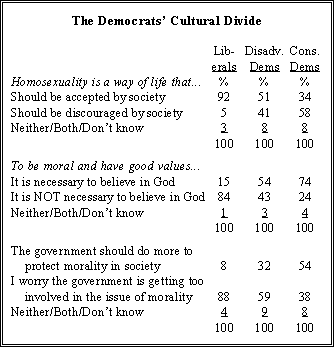 Kerry’s voting base in 2004 tend to agree with Republican groups more than other Democratic groups when it comes to key social issues such as gay marriage and abortion.
Kerry’s voting base in 2004 tend to agree with Republican groups more than other Democratic groups when it comes to key social issues such as gay marriage and abortion.
Of equal importance, Liberals, who represent 17% of the general public and 39% of John Kerry’s voting base in 2004 are distinct from all other typology groups for their secular values. Fully 84% of Liberals say a person need not believe in God in order to be moral and have good values, while the majority of Conservative and Disadvantaged Democrats disagree. This secular/religious divide is connected to very different views of the role of government. A majority of Conservative Democrats would like to see the government do more to protect morality in society, while just 8% of Liberals agree. Most strikingly, more than nine-in-ten Liberals (92%) say that homosexuality should be accepted by society as a way of life, whereas only half of Disadvantaged Democrats (51%) and only a third of Conservative Democrats (34%) agree.
Democrats Divide over Regulation, Environment, Immigration
While religious and moral beliefs form a clear area of contention within the Democratic electoral coalition, this is not the only arena in which there is substantial disagreement. In particular, the economic insecurity faced by most Disadvantaged Democrats is linked with a number of attitudes toward regulation, the environment, and immigration that are not typically associated with liberalism.
At root, most Disadvantaged Democrats, who make up 10% of the general public and 22% of Kerry’s voting base in 2004, are struggling financially and are pessimistic about their opportunities to improve their situation. This gap is most notable with respect to feelings of individual empowerment. By a 79% to 14% margin, Disadvantaged Democrats believe that hard work and determination provide no guarantee of success for most people. By comparison, the 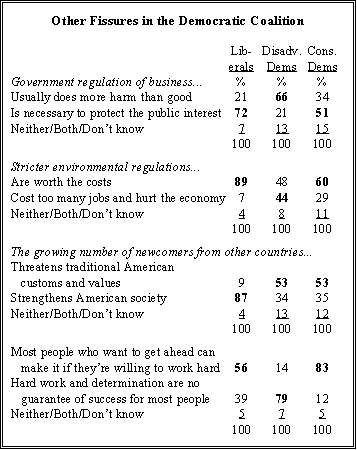 majority of Liberals and Conservative Democrats believe that most people who want to get ahead can make it if they are willing to work hard.
majority of Liberals and Conservative Democrats believe that most people who want to get ahead can make it if they are willing to work hard.
While the Democratic Party is generally viewed as more favorable toward the environment and government, this basic difference with respect to wealth and opportunity creates significant divisions within the party in these areas. While most Liberals and Conservative Democrats believe government regulation of business is necessary to protect the public interest, the majority of Disadvantaged Democrats believe government regulations usually do more harm than good. And Liberals and Conservative Democrats believe that stricter environmental regulations are worth the costs, a view shared by majorities in two of the three Republican groups as well. But fewer than half of Disadvantaged Democrats agree, while 44% say that stricter environmental regulations cost too many jobs and hurt the economy.
The various groups in the Democratic coalition also have different values with respect to the impact of newcomers to America. By an 87% to 9% margin, most Liberals believe the growing number of immigrants strengthens American society, but only about a third of both Disadvantaged and Conservative Democrats agree. Instead, most in these groups say the influx of newcomers to this country poses a threat to traditional American values and customs.
These internal divisions even carry over into beliefs directly related to the role of government. Disadvantaged Democrats express far more cynicism about persistent government waste and inefficiency, as well as government officials losing touch with the people, than do other Democratic typology groups. Conservative Democrats are much more likely to believe that poor people have it easy because they can get government benefits without doing anything in return, while Liberals and Disadvantaged Democrats strongly believe that poor people lead difficult lives because benefits don’t go far enough.
Divided GOP Values on Government, Business, Poverty
The Republican Party is often characterized as being pro-business, anti-regulation, and opposed to broad government programs to assist the poor. However, not all segments of the GOP’s electoral coalition share these values. Most notably, Pro-Government Conservatives, who make up 9% of the general public and 15% of Bush’s 2004 voting base, tend to favor government action across the board, whether the topic is public morality, anti-poverty assistance, or regulation. And while both Social and Pro-Government Conservatives are strong advocates of traditional moral values, there is a huge economic divide between the two, which leads to starkly differing views on other social, economic, and governmental issues.
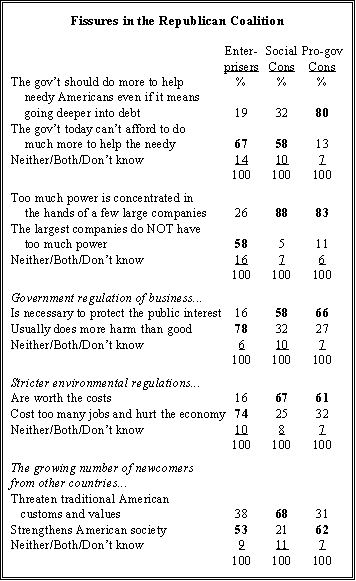 This combination contributes to dramatic differences on such core values as the government’s responsibility to the poor. While 80% of Pro-Government Conservatives say the government should do more to help the needy, even if it means going deeper into debt, the majority of Social Conservatives and two-thirds of Enterprisers take the opposing view that the government can’t afford to do much more to help the needy.
This combination contributes to dramatic differences on such core values as the government’s responsibility to the poor. While 80% of Pro-Government Conservatives say the government should do more to help the needy, even if it means going deeper into debt, the majority of Social Conservatives and two-thirds of Enterprisers take the opposing view that the government can’t afford to do much more to help the needy.
While Social Conservatives largely side with Enterprisers on welfare, they side with the less affluent Pro-Government Conservatives when it comes to business and regulatory issues. By overwhelming margins, both Social Conservatives and Pro-Government Conservatives hold negative views of business, while Enterprisers stand apart from the rest of the country with their consistently favorable views of business and the marketplace. This divide is reflected in other values about regulation and the environment as well. While 78% of Enterprisers believe government regulation usually does more harm than good, sizeable majorities of the other Republican typology groups believe regulation of business is necessary to protect the public interest.
Environmental protection also stands out as a major divide within the GOP’s coalition. Most Enterprisers believe the country has gone too far in its efforts to protect the environment, while roughly eight-in-ten Social and Pro-Government Conservatives take the opposing view that we should do whatever it takes to protect the environment. Similarly, while three-quarters of Enterprisers see environmental regulation as mostly hurting the economy and jobs, more than six-in-ten in the other GOP groups say stricter environmental protections are worth the costs.


